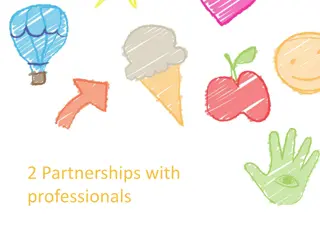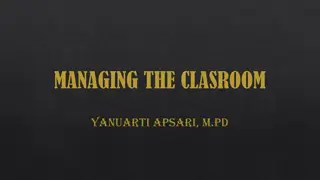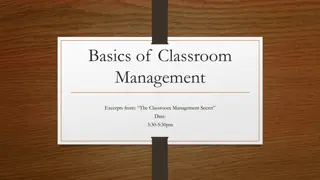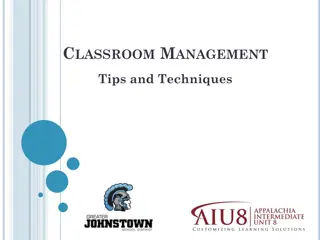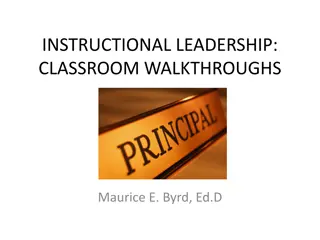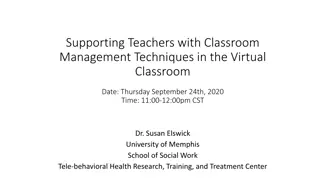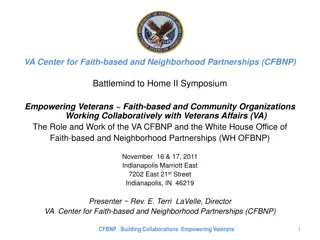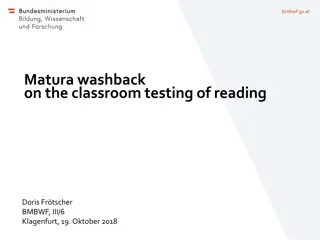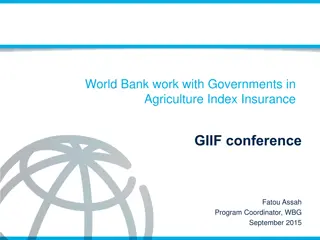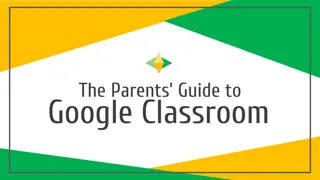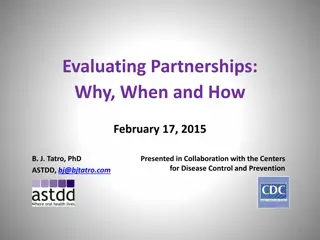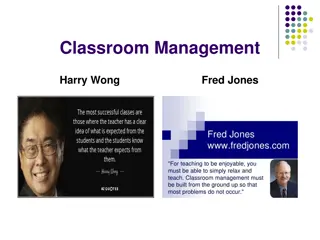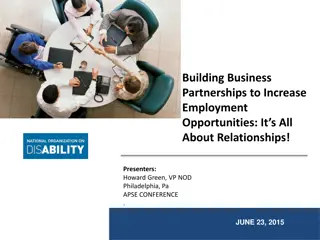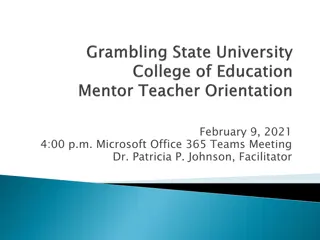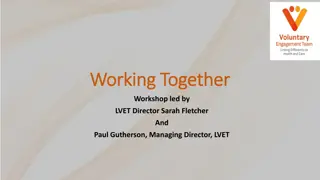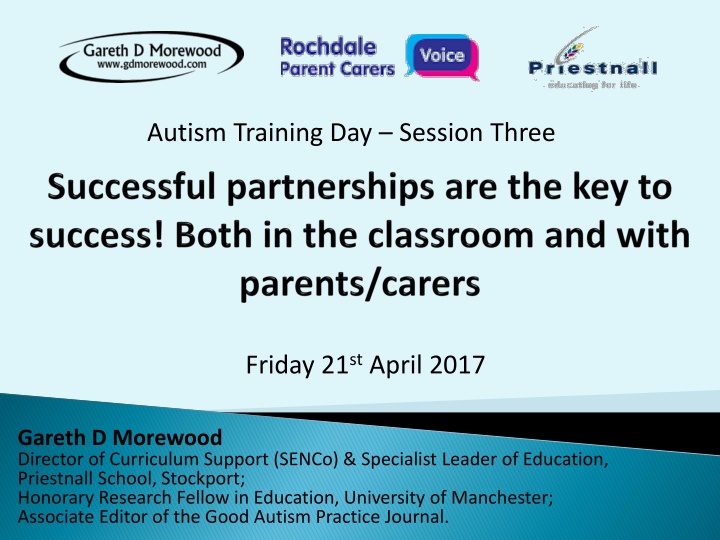
Effective Strategies for Supporting Students with Autism in Educational Settings
Explore innovative ways for planning, data sharing, and student support in educational partnerships with insights from Gareth D. Morewood, an expert in autism education. Learn about different types of support, required skills, and effective practices to enhance student progress and independence.
Download Presentation

Please find below an Image/Link to download the presentation.
The content on the website is provided AS IS for your information and personal use only. It may not be sold, licensed, or shared on other websites without obtaining consent from the author. If you encounter any issues during the download, it is possible that the publisher has removed the file from their server.
You are allowed to download the files provided on this website for personal or commercial use, subject to the condition that they are used lawfully. All files are the property of their respective owners.
The content on the website is provided AS IS for your information and personal use only. It may not be sold, licensed, or shared on other websites without obtaining consent from the author.
E N D
Presentation Transcript
Autism Training Day Session Three Friday 21st April 2017 Gareth D Morewood Director of Curriculum Support (SENCo) & Specialist Leader of Education, Priestnall School, Stockport; Honorary Research Fellow in Education, University of Manchester; Associate Editor of the Good Autism Practice Journal.
To develop new, more effective ways for planning and record keeping To understand data better and how to share information as part of the learning partnership To consider the Student Passport and how it can directly support learning and understanding within the partnership To consider what kinds of support are the most effective in helping students make progress www.autism.manchester.ac.uk www.gdmorewood.com
Think about the types of support and styles you see in your setting What type of support is most appropriate for what activity? Why? What skills are required? www.autism.manchester.ac.uk www.gdmorewood.com
Velcroed support Helicopter support Bridge Builder support Class / year support Specialist support Subject-specific support www.autism.manchester.ac.uk www.gdmorewood.com
Effective practice in relation to TAs involves contributions that: foster the participation of learners in all aspects of learning and development - the academic and social processes of the school seek to enable learners to become more independent learners and understand their own needs help to raise standards of learning for learners and narrow gaps in attainment with peers and expectations www.autism.manchester.ac.uk www.gdmorewood.com
Not enough Teaching Assistants record keep should they? Your thoughts? What do you do? Why are records important? Joint planning and record keeping always generates debate .... Is it possible? What can you do? ... and why? www.autism.manchester.ac.uk www.gdmorewood.com
What is the impact on student progress and how do you analyse whether strategies are effective? This is very important but often overlooked ... A rigorous system of professional development and impact analysis must be part of whole school systems It is simply not good enough not to know ; how can you know and what evidence do you need? www.autism.manchester.ac.uk www.gdmorewood.com
Joint planning is it impossible? How can you gauge progress and be more aware of learners capabilities with regard to their prior learning and understanding and plan very effectively to build on these? How can you help learners understand in detail how to improve their work and are consistently supported in doing so? This is what you can do ... Make sure there is a positive system linked into these outcomes some ideas ... What do you do? www.autism.manchester.ac.uk www.gdmorewood.com
New research (Higgins et al) demonstrates that how Teaching Assistants are used can be extremely effective in narrowing gaps in attainment It is important that TAs don t simply do thinks for a young person and create a learned helplessness ; but are pro- active in using evidence-based techniques that are proven This may require a new way of working , but is essential in order to meet modern need and work effectively in partnership with teaching staff Let us consider two high impact methods: feedback & meta-cognition & self-regulation www.autism.manchester.ac.uk www.gdmorewood.com
Research suggests that providing effective feedback is challenging. To be effective, it should be: About challenging tasks or goals rather than easy ones; Given sparingly so that it is meaningful; About what is right more often than about what is wrong; Specific, accurate and clear, e.g. not just correct or incorrect ; Provide examples of what is correct and not just tell students when they are wrong; Encouraging and supportive of further effort without threatening a learner s self-esteem; (from Education Endowment Foundation - http://educationendowmentfoundation.org.uk/toolkit) www.autism.manchester.ac.uk www.gdmorewood.com
Research suggests that: Teaching approaches which encourage learners to plan, monitor and evaluate their learning have very high potential, but require careful implementation. Teach students explicit strategies to plan, to monitor and to evaluate their learning and give them opportunities to use them with support and then independently. When using approaches for planning, ask students to identify the different ways that they could plan (general strategies) and about the best approach for a particular task (specific technique). Monitoring involves identifying the key steps they need to be aware of as they go through a task to keep it on track where might this go wrong; what will be the difficult parts (from Education Endowment Foundation - http://educationendowmentfoundation.org.uk/toolkit) www.autism.manchester.ac.uk www.gdmorewood.com
Research suggests that: Intensive tuition in small groups is very effective; Students can be grouped according to current level of attainment or specific need; It is important to assess students needs accurately and provide work at a challenging level with effective feedback and support; The cost effectiveness of one-to-two and one-to- three indicates that greater use of these approaches would be productive in schools; Professional development and evaluation are likely to increase the effectiveness of small group tuition; (from Education Endowment Foundation - http://educationendowmentfoundation.org.uk/toolkit) www.autism.manchester.ac.uk www.gdmorewood.com
Research suggests that: Activities should be sufficiently challenging for the tutee that they can benefit from the tutor s support but not too difficult that they cannot succeed with support; There are several different approaches to peer-tutoring which make different demands on the teacher(s) organising the pairs and on the tutors and tutees; Reviewing challenges and successes with tutors will improve their skills and learning; Relatively short but intensive periods of tutoring over 4-10 weeks are likely to be more effective than for a longer period with more routine sessions; (from Education Endowment Foundation - http://educationendowmentfoundation.org.uk/toolkit) www.autism.manchester.ac.uk www.gdmorewood.com
Develop a new way of supporting students and teacher s understanding Lots of different ideas, but our Student Passports have been hugely successful Here is a short film explaining why Based on high impact research; engages students in learning to learn - metacognative approaches and (most importantly?) www.autism.manchester.ac.uk www.gdmorewood.com
Teacher Keeps the young person central to provision Essential as part of our student centred approach A useful tool to engage parents/carers Student Passport Student /Learner Teaching Assistant Parent/ Carer www.autism.manchester.ac.uk www.gdmorewood.com
Deploying additional adults to simply answer the deficit in attainment is NOT the key Best Buys are what works well for you Support Staff are essential as part of a whole-school approach; not simply THE answer on its own REMEMBER effective support is essential for students with SEND and other vulnerable groups to make progress additional adults form an important part of that support when used effectively. www.autism.manchester.ac.uk www.gdmorewood.com
It is very easy to look at things you cannot do and focus on them Think back to the key themes in making the learning partnerships more effective: Passports to support learning and participation Use of data to increase understanding Development of Daily Record Sheets to inform provision Use of Feedback and Metacognition www.autism.manchester.ac.uk www.gdmorewood.com
Being a positive as possible and working in a solution focused manner is important Whilst remembering that the learner should be central to all decision making Questions to keep in the forefront are: What can we do to solve this? How can we do this differently? What are the outcomes for the learners? How can we demonstrate progress/impact? www.autism.manchester.ac.uk www.gdmorewood.com
In developing a can do, positive ethos peer education is very important If they don t understand other children may: resent extra attention given to an individual be hurt if their social advances are ignored or rejected be distracted/disrupted feel that the child gets away with things be nervous of or frightened by the other learner In some cases may respond by, ignoring, teasing, winding him up or bullying www.autism.manchester.ac.uk www.gdmorewood.com
PostcardsLettersE-mailsTextsetc Any positive contact home is immensely powerful Often schools get into negative spirals Establish one or two positive mechanisms [some at relatively low cost] and see what the impact is? Never forget how you feel when you are praised Providing positive feedback to learners and parents/carers is a powerful part of supporting the progress of individual learners www.autism.manchester.ac.uk www.gdmorewood.com
Using visuals to support young people with routines and processes can be extremely effective This is often considered as method for young people with autism , however experience shows that Visual Supports can reduce anxiety and risks associated with uncertainty for all learners See some examples that follow and develop a series of Visual Supports for recurring events and situations www.autism.manchester.ac.uk www.gdmorewood.com
The impact of language and communication with students on the autistic spectrum is pivotal to successful inclusion Almost everything we do involves speech, language & communication: Making ourselves known Expressing our likes and dislikes Interacting and building relationships with others Writing answers to exams and essays Etc etc etc www.autism.manchester.ac.uk www.gdmorewood.com
to teach a child who has never been able to communicate by language seems to us just as much educational provision as to teach a child to communicate in writing R vs Lancashire County Council ex parte M (1989) www.autism.manchester.ac.uk www.gdmorewood.com
Being able to understand whats happening and take part in lessons Learning to read and write Being able to think things through Being able to regulate feelings and emotion These are key factors facing all young people but of particular challenge for young people on the autistic spectrum www.autism.manchester.ac.uk www.gdmorewood.com
Possible difficulties can include:- Speech is difficult to understand, which might include difficulty making different sounds Problems discriminating between speech sounds, so conscious and conscience might sound the same Stammering or stuttering where sounds or words are repeated or may be difficult to produce without effort Difficulty using intonation to add meaning to words www.autism.manchester.ac.uk www.gdmorewood.com
Using sentence structures more appropriate for someone younger Problems linking sentences with words such as so , and , but , then Difficulties sequencing sentences to make meaningful narrative Problems learning new words Difficulties finding the right words at the right time Limited vocabulary for emotions, thoughts and feelings Difficulty understanding complex sentences Difficulty understanding idioms such as don t hit the roof www.autism.manchester.ac.uk www.gdmorewood.com
Limited eye contact Poor turn taking and difficulty with starting and ending conversations Difficulty getting a conversation back on track after two people have talked at once Difficulty understanding and responding to feedback from the listener, not noticing when someone is bored or doesn t understand Difficulty staying on topic Problems using language to negotiate in discussions or arguments www.autism.manchester.ac.uk www.gdmorewood.com
Considering communication (in its widest sense) is essential Children who are capable of forming views have right to receive and make known information, to express an opinion and to have that option taken into account in any matters affecting them. Article 12, UN Convention on the Rights of the Child www.autism.manchester.ac.uk www.gdmorewood.com
The 5 Key Components for Learning are? Listening / Attention Memory Motivation Learning Style Language Skills www.autism.manchester.ac.uk www.gdmorewood.com
How young people see themselves is an important factor, often missed http://www.youtube.com/watch?v=Oj0EwWNtk3A www.autism.manchester.ac.uk www.gdmorewood.com
Using assemblies is a useful mechanism to stand up and show what you are about Previous assemblies can be downloaded from www.gdmorewood.com However let us consider a specific example http://www.youtube.com/watch?v=jVqRT_kCOLI www.autism.manchester.ac.uk www.gdmorewood.com
www.autism.manchester.ac.uk www.gdmorewood.com
www.autism.manchester.ac.uk www.gdmorewood.com
Show someone next to you Do you have a hidden talent? Experiencing is very powerful Actually doing and seeing is one of the most effective ways of communicating especially for young people with autism How often do we give young people that chance? www.autism.manchester.ac.uk www.gdmorewood.com
Key findings from our research: Keep parents/carers informed Make sure they know who to contact and how Provide honest communication no long-term benefit in providing anything but the truth Listen to parents/carers give them time Try to avoid uncertainty/misinterpretation Morewood, G. D., & Bond, C. (2012)Understanding Parental confidence in an inclusive high school: a pilot survey.Support for Learning, Vol. 27 No.2, p53-58 Wiley Blackwell Publishing. www.autism.manchester.ac.uk www.gdmorewood.com
Leading Parent Partnership Award - www.lppa.co.uk A structure to support parental engagement Positive texts www.teachers2parents.co.uk Positive postcards - www.vistaprint.co.uk Letters... Phone calls... E-mails... Remember parent/carer judgements can stem from lack of information and/or understanding why not help? www.autism.manchester.ac.uk www.gdmorewood.com
Learning, study & education essential Mainstream inclusion common sense Preparation for adulthood for life Behaviour & challenge positive approaches The need for therapy positive approaches Developing whole-person skills the self www.autism.manchester.ac.uk www.gdmorewood.com
Learning isnt always the same ... www.autism.manchester.ac.uk www.gdmorewood.com
www.autism.manchester.ac.uk www.gdmorewood.com
Gareth D Morewood www.gdmorewood.com @gdmorewood www.autism.manchester.ac.uk www.gdmorewood.com


